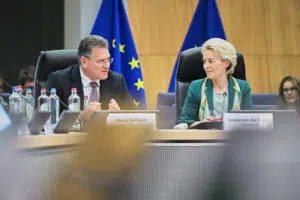Brussels – The EU Commission’s third Clean Transition Dialogue with Europe’s clean technology industries opens with a promise: “We want to hear what you need to be successful in meeting your climate goals” to make the Green Deal “tailored.” It was the president of the European Commission, Ursula von der Leyen, who opened this morning (Feb. 22) the meeting with representatives from the key strategic sectors of batteries, semiconductors, wind and solar energy, carbon capture and storage, and electric vehicle charging: “We have mobilized an unprecedented share of public funding to also push private leverage on clean technologies.”

The EU Commission head recalled that at the European Industry Summit on Tuesday (Feb. 20), the main message was: “Yes, the industry supports the climate goals of 2050 and 2040. We support the Green Deal. It is not a discussion about the ‘what’. We want to be involved in the discussion about the ‘how’ we are getting here.” That’s why the task of Brussels is to offer predictability and clarity to build confidence in the clean technology industries, following the first in the hydrogen sector and the follow-up in energy-intensive ones: “Only what gets measured really gets done,” von der Leyen made clear. The final report on the results of the Dialogues, which the Commission chair anticipated “will be ready before the next meeting of the European Council” scheduled for March 21-22, “also with your input,” is now expected on April 10 – as seen in the agenda of scheduled items of the College of Commissioners.
Regarding the challenges facing the clean technology industries, one of the most pressing is the energy situation, which, although it has “stabilized at the pre-war level,” still shows “higher prices than in other parts of the world, and this is a question of competitiveness,” von der Leyen warned, stressing that “we still need to work on structural solutions for energy prices.” The EU executive’s commitment has been directed not only toward “diversification of sources,” but the direction in the long term is toward renewable energy because “not only good for the planet, but it is also good for our energy security and thus for our independence.” This is precisely where the “unprecedented” public investments to clean tech fit in, as evidenced by the EU’s commitment with “150 billion euros from Next Generation EU and RePowerEu in the transition to clean energy” and the fact that they “are among the biggest beneficiaries of the Innovation Fund.” From the 3 billion for the battery value chain to the 3 billion for the new hydrogen bank to the Strategic Technologies Platform for Europe based on the principle of facilitating the use of available funds through a “one-stop shop” that will engage the Commission to look for what is the best fund for eligible companies and help them get funding.
The meeting with companies active in the clean technology sector, inevitably led von der Leyen to reflect on China, from electric cars to critical raw materials. “Electric vehicles on the market are heavily subsidized,” and Beijing “has a huge overproduction that it channels to the European market because the United States has already closed its market.” Faced with this situation, “we have to be very careful so that the European market is not flooded through dumping,” she warned, reiterating the need to “provide the tools to ensure” European companies “can compete on the same level playing field,” including the anti-subsidy investigation. Regarding critical raw materials, there is a high alarm level regarding Beijing’s monopoly: “97 percent of the lithium we use in the EU comes from China. We are totally dependent.” Having learned “the bitter lesson” of dependence on Russia for fossil fuels, the EU executive knows that “we have to allow you to have access to the critical raw materials you need” through diversification of supply: “We have the Global Gateway, with which we create partnerships with different regions of the world,” as evidenced by “the agreement with Chile on lithium,” von der Leyen concluded.
English version by the Translation Service of Withub




